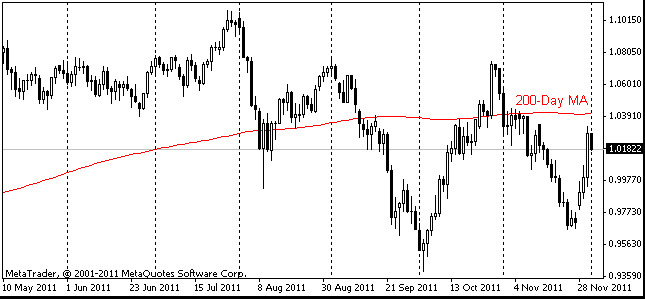EUR/usd
The single currency didn't continue last week's downturn yesterday. It was good news, but at the same time the currency didn't grow on the subsiding fears around Greece. And this is already the signal to give a closer look to the issues currently disturbing the markets. As always there are two directions: Europe and the USA. However, while concerns about America seem to be the whims of a spoilt child, European issues look like life-and-death ones. Tonight we'll see the Fed's decision on the monetary policy. No factual action is expected: everybody looks forward to learning the committee's evaluation of the economic health and their sentiment concerning the economic prospects. After the release of strong employment data market participants expect the mid-year QE to be carried out on a smaller scale than before. The markets behave as if they were given ordinary porridge instead of a delicious apple pie. This is unlikely to last for long. Money is still very, very cheap; inflation will likely speed up because of the rise in energy prices; economic activity is following the right path. Hardly had Europe breathed a sigh of relief concerning Greece, when similar issues started to pop up in other troubled countries. Spain claims that it won't be able to meet its agreed budget deficit targets, especially under the circumstances of a severe economic recession expected this year. Assuming that the markets will treat Spain in the way they treated Greece, the size of bailout / debt write-off may amount not to hundreds of billions, but to trillions. However, at this stage markets see a great deal of good news and key central banks mainly stick to the expansionary policy. It means that the single currency may get some support and find buyers on the dips.

GBP/USD
The British housing market is gradually stabilizing. According to RICS, house price balance is at 13% (i.e. the number of those who expect the further decline in prices is 13% larger than that of those who await their growth). The figure is still negative, but it's been in an upward trend since October 2010. The data on January's trade balance were published earlier today. The December statistics, reflecting a pretty good cut in the balance deficit, were quite favourable. However, the rise in energy prices inevitably led to the deficit increase. The visible trade deficit (in goods) is now close to the spring 2008 levels and made 7.5 billion in January against the expected 7.9 billion. But this progress seems to be really insignificant, if we consider the dramatic pound devaluation and rising inflation. If it further goes this way, Britain will have to acknowledge the failure of its devaluation policy to boost the industry growth. It is the financial sector alone that may benefit from the implementation of taxes on financial transactions in the rest part of Europe. The British are to do their best not to lose their competitive advantage in this industry.

USD/JPY
The Japanese currency is again moving sideways, mainly between 82,10 and 82,40. The attempts to stir up the pair seem to be vain. Today the bank of japan has held its regular meeting which has resulted in strengthening of the foundations for the economic growth (the so-called growth-supporting funding facility) by ¥2 trln., from 3.5 trln. to 5.5 trln. In addition, they've created another fund of ¥0.5 tlrn. to issue smaller loans initially ineligible for the growth-supporting funding facility. Besides, the Bank will use its US dollar reserves to finance investments and loans denominated in foreign currencies. For this purpose it's been decided to allocate one more trillion yen. However, the detailed account of the terms, on which these loans will be issued, is scheduled for the next meeting of the committee. The bank has also extended application deadlines for the previously set up lending funds. Such news has yet to be digested by the markets, but, most likely, this policy of the Bank will keep contribute to the yen weakening.

AUD/USD
The Australian currency keeps ignoring the domestic news and reacts only to the sentiments dominating in the overseas markets. Today's data on home loans have come in far below everyone's expectations. The indicator has lost 1.2%. Investment lending has also declined sharply, having lost 7.1% in January. Yet the aussie managed to avoid the sales as traders considered the currency to be already oversold. The positive sentiment in the stock markets supported the demand for the risky Aussie, which is now trading near 1.0550 after the drop down to 1.0470 yesterday.
